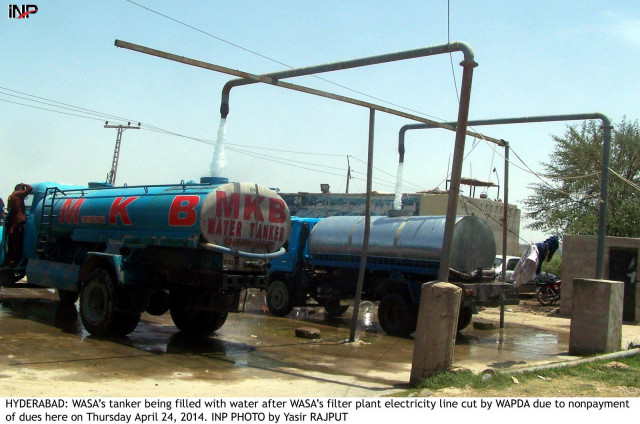Taking the initiative: KWSB installs generators in small pumping stations to improve supply
The water utility is aiming to provide water around the clock during Ramazan.

As the electricity crisis in the city worsens, and the K-Electric and the government both fail to help, the Karachi Water and Sewerage Board (KWSB) has taken it upon itself to repair the generators in some of its 250 small pumping stations, and install them in the others, to ensure smooth supply of water in the city.
"We have been experiencing power supply issues in all our pumping stations, both small and large, and are therefore installing generators in our small pumping stations to ensure that water supply is not affected," said KWSB managing director Qutubuddin Sheikh.
Sheikh added that the water crisis has worsened since last year due to load-shedding. "Most of the time, our pumping stations have been unable to function properly as the supply of electricity was often interrupted," he said. "The city faces a shortage of 100 to 150 million gallons of water per day (MGD), depending on the time of the year."
The installation of the generators is not the only measure that the water supply company is taking to prepare for Ramazan. "We have directed all zonal managers, district chief engineers and executive engineers to monitor all pumping stations in order to ensure smooth water supply, especially to all places of worship and residential areas."
Pointing fingers
However, despite the measures, Sheikh remained pessimistic about KWSB's bid to provide continuous water. He claimed that two of their main pumping stations - Gharo and Dhabiji - experienced load-shedding on Friday, leading to a shortage of 124MGD, while on Saturday, the city faced a 115MGD shortage. "Shortage of water and load-shedding have had an adverse effect on the water-supply cycle of the city and this may cause people to suffer in Ramazan as we may be unable to provide an uninterrupted supply of water to residential areas," he said. "During the power crisis, the water in the pipelines starts to flow backwards and old pipes are unable to bear the reverse pressure. Resultantly, the pipelines develop cracks at different points, which in turn further decrease the supply of water due to leakages."
Sheikh also warned that if K-Electric does not exclude pumping stations from its load-shedding schedules, the water shortage in the city will worsen in the next few days.
"We have to keep all pumping stations operational, at least until the new K-4 project is developed" he commented.

K-Electric refutes KWSB's demands
The K-Electric spokesman, while praising KWSB's initiative of reinstalling generators at all small pumping stations, said that is not possible to exempt all KWSB pumping stations from load-shedding, especially the small ones. However, he refuted KWSB's claim that major pumping stations have also been experiencing load-shedding.
"The small pumping stations are linked to PMTs and we have to follow the announced load-shedding schedule for those areas," he said, adding that it is not possible to install designated PMTs for small pumping stations. "However, all major pumping stations, including Gharo, Pipri and Dhabiji are exempt from load-shedding and they receive electricity around the clock."
Published in The Express Tribune, June 29th, 2014.



















COMMENTS
Comments are moderated and generally will be posted if they are on-topic and not abusive.
For more information, please see our Comments FAQ